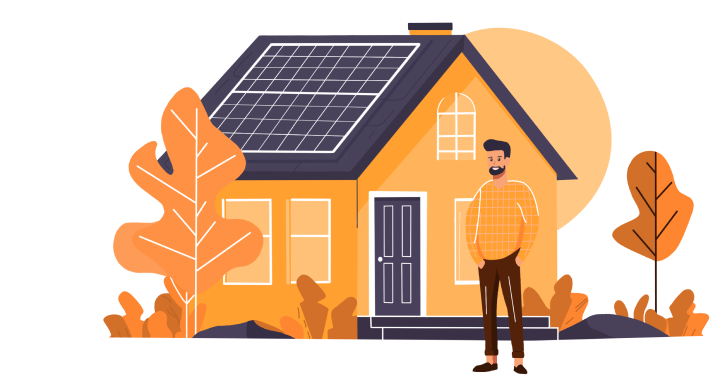Solar power installation price is a critical consideration for homeowners looking to transition to renewable energy.
With rising energy costs and growing environmental awareness, the financial implications of installing solar panels are more important than ever. In this article, we'll break down the costs associated with solar power systems, from equipment and labor to permits and financing options.
Whether you're calculating potential savings or exploring financing solutions, you'll find essential insights to guide your decision-making process. Let's delve into what it really costs to harness the power of the sun.
Step #1: Evaluate your energy needs
Analyze your past utility bills to understand your electricity consumption patterns, which will help determine your potential solar power installation price.
Implement energy-saving measures like LED lighting and energy-efficient appliances to reduce overall consumption and solar energy cost. Upgrading insulation or windows can also enhance energy conservation, making it cheaper to install solar power.
By focusing on your specific energy usage patterns, you'll know how much electricity you'll need, which will determine the solar power installation price.
Step #2: Explore equipment and labor costs
Residential solar panels vary in efficiency and price, from monocrystalline to polycrystalline and thin-film panels. Higher efficiency solar energy panels, though more expensive, require less space regardless of their placement and generate more power, leading to long-term savings.
The complexity of your home's roof affects solar energy installation difficulty and cost. Difficult-to-access roofs may increase labor costs. Some homes may require additional structural support for rooftop solar panel installation, impacting overall costs.
Consider inverter options, mounting systems and additional components like wiring and connectors. Understanding these specifics helps budget accurately and ensures the right balance of cost and performance.
Step #3: Factor in permits and incentives
Identify and secure any local permits required for installation of solar panels and check for zoning restrictions. Engaging with local authorities or a professional service can streamline the process of significantly reducing your solar power installation price.
Look into the Investment Tax Credit (ITC) and other state or local solar energy benefits and incentives. In some regions, you can even earn Renewable Energy Certificates (RECs) for the energy generated through solar panels for off-grid living.
Step #4: Choose Solar Energy Host
Solar Energy Host connects you with top local providers to ensure you receive competitive quotes tailored to your specific needs. By working with expert installers, you can achieve maximum efficiency and get a better solar power installation price.
We help you start saving with the best offers available and provide comprehensive support throughout the installation process. We provide reliable, comprehensive information and competitive quotes from top local solar company installers.
Selecting Solar Energy Host ensures seamless, cost-effective and reliable solar installation options. With our support and expertise, you can confidently move forward with your solar energy system installation, knowing you have a committed partner every step of the way.
Frequently Asked Questions (FAQ)
Are there any ongoing costs after installing solar panels?
Yes, while solar panels significantly reduce electricity costs, there are some ongoing expenses to consider. These include routine maintenance, such as cleaning and inspection, and potential repairs.
Inverters, an essential component of the solar system, may also need replacement every 10 to 15 years. However, these costs are relatively low compared to the savings on your energy bills when you install a solar panel system.
What is the typical lifespan of a solar power system?
The lifespan of a typical solar power system ranges from 25 to 30 years. During this time, the efficiency of solar panels may decrease slightly, generally at a rate of about 0.5% per year. Proper maintenance and solar panel placement can help ensure that your system operates effectively for as long as possible, enhancing the value of the solar power installation price.
Are there different financing options available for solar installation?
Absolutely. Homeowners can choose from several financing options when working with solar company installers:
- Loans: Similar to other home improvement loans, you can borrow money to cover solar installations.
- Power Purchase Agreements (PPAs): With a PPA, you agree to purchase the power generated by the system at a set rate, usually lower than the local utility rate.
- Direct purchases: Paying upfront for the solar system avoids ongoing payments and maximizes financial benefits.
- Local and federal incentives: Many areas offer incentives such as tax credits, rebates, and grants that can significantly reduce the overall cost.
These options provide flexibility to choose the best financial strategy for your circumstances, making the overall solar power installation price lower and more accessible to a broader range of homeowners.
Why Choose Solar Energy Host for Your Solar Solutions
At Solar Energy Host, we streamline your switch to solar savings with precision and care. Our platform empowers homeowners by providing free, competitive quotes from top local providers tailored to your specific needs when you need to install solar power.
Trust Solar Energy Host to deliver secure, fast, and reliable service that guides you to the best deal from solar installation companies. Our commitment to transparency and support ensures that every step towards solar is a step towards a sustainable future.
Calculate how much you will save with solar panels!














